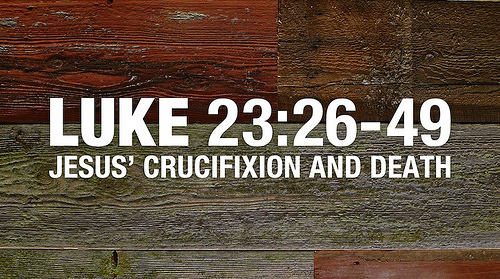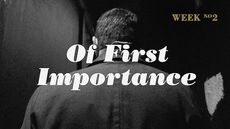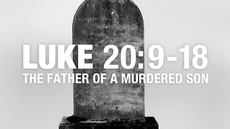 From the Nov. 6 sermon, "Jesus' Crucifixion and Death," preached by Pastor Mark out of Luke 23:26–49.
From the Nov. 6 sermon, "Jesus' Crucifixion and Death," preached by Pastor Mark out of Luke 23:26–49.
The Gospel of Luke culminates in the most important death of the most important person in the history of the world. Nothing is as important as one thing: that Christ died for our sins according to the Scriptures. Jesus was brutally murdered by us, but it was also for us. He died to forgive, love, serve, seek, save, and adopt us. On the cross he became our substitute, our sin was imputed to him, and he became cursed, which was more difficult to bear than even his physical suffering. Like those who were present on that day, you can respond in passive unbelief, active unbelief, or belief. Trust in Jesus.
Their unbelief is passive. They don’t oppose Jesus; they simply observe him. Perhaps that is some of you. You do not oppose Christianity. You do not hate Jesus. You also do not consider yourself a Christian, and you do not defend the cause of Jesus. Instead, you are simply, merely an observer. You’re passive in your opposition to Christianity. You watch. You come to church now and then, maybe observe the life of a few Christians, perhaps have your own internal judgments, but not say anything publicly. You’re not divisive. You’re not mean. You’re not rude. You’re not necessarily for or against Jesus Christ. You are, instead, passive in your opposition as an observer. Many were in that place, including the men. They watched what happened. They didn’t necessarily agree or oppose. They were indifferent. But here’s the truth. Jesus says, "You’re either for me or against me." And anyone who is passive and merely observing Christianity, is not for Jesus.
As others are mocking Jesus, he says, "Have you no fear of God? Do you not know who this is?" He rightly proclaims the sinless nature of Jesus. "This man has done nothing wrong." And then he says, "But I have." This is where Christian faith begins. It begins with an acknowledgment, an honest assessment, "I’m a sinner. I’m a sinner." You can’t blame it on your parents. You can’t blame it on your culture. You can’t blame it on your genetics. You can’t blame it on your personality type. You’re just a sinner. I’m a sinner. We sin in our thoughts. Aren’t you glad people can’t see what we’re thinking? We sin in our words. Have you said or typed something you really regret? We sin in our deeds. Have you done things you weren’t supposed to do? We sin in our motives. Do you do good things, but just to manipulate others and get praise? Do you get angry and upset when people don’t compliment you for the good things you did? We sin through commission. We do stuff we’re not supposed to. We sin through omission. We don’t do things we’re supposed to. We’re all sinners.[more]
Cicero said that decent Roman citizens shouldn’t even speak of crucifixion because it was so barbarous and horrific, that Romans not only avoided crucifixion, it was for those who were foreigners. They shouldn’t even speak of it. In Deuteronomy 21:22–23, God declares, "Cursed is anyone who is hung on a tree." So, for the Jews, it can’t get any worse. Crucifixion, however, happened all the time. For example, on the day that Spartacus fell in battle, six thousand people were crucified in one day, along roughly a 120-mile stretch of highway. If you could even imagine jumping on, let’s say, I-5, and driving for two hours, and along the way on the shoulder of the road, there were interspersed 6,000 bleeding, weeping, suffering, dying people. One day, 6,000 people were crucified. They did this in public places, places that there was shopping, places where people were gathering, so that they could maximize the crowds. [ … ] Some people tried to hasten their death. They would just try and slouch, so they, insofar as we can tell, archeologically, they’d put a seat underneath their buttocks to hold them up to make it last as long as possible. After they died, the bodies were often just discarded. Some historians record that occasionally a stray dog would bring a foot or a hand home. Friends, this is what we did to God.
Here’s why it’s good news: He did it for you. He died for you. And the Bible uses this little word: "for." It tells us that Jesus died, and then it tells us that he died for us. See, if there’s no "for," there’s no good news. You killed God! That’s not good news. And he died to forgive you, to love you, to serve you, to seek you, to save you, to adopt you! He did it for you! [ … ] Isaiah 53:5—700 years before Jesus was born, because this is the book that God wrote predicted the future: "He was wounded for transgressions," sins. Do you have any sins? That’s why Jesus died! So, you don’t need to say, "I’m a good person." You could say, "Jesus is a good Savior." You don’t need to say, "I’ve lived a good life." You need to say, "I haven’t lived a good life. Jesus lived a perfect life." "He was crushed for our iniquities." What happened to Jesus is what happens to all who don’t trust in him. They suffer in a horrific way. But, friends, here’s the good news: if you trust in Jesus, God does not punish you. … Right now, you need to know, if you’re in Christ, God doesn’t punish you, God hasn’t punished you, and God won’t punish you, because Jesus was punished in your place as a substitute for your sins, and it would be unjust for Jesus to be punished and you.
Here’s how [Paul] says it in Romans 5:8, "God demonstrates his love for us in this—" You wonder if God loves you? "God demonstrates his love for us in this! While sinners, while rebelling, Christ died for us." You can look to the cross and say, "I know God loves me! He became a man. He lived without sin. He lived the life I’ve failed to live. He died the death I should’ve died. He gives the gift I cannot earn. I know God loves me, not just because he gave me health, or wealth, or comfort, or convenience. God gave me God! God gave me God! God gave me himself! God gave me his Son! God gave me salvation!" God does love you so deeply, so passionately, so intimately, so perfectly that when he chose to give to you, he gave you himself. You’re loved. You’re loved in a way that nobody could ever love you, not with that perfect, unbroken, unyielding love. And here’s what’s wonderful about the love of God, given through the death of Jesus. Because here’s the truth. We’re not undeserving. We’re ill deserving. Because you didn’t deserve the love of God, you can’t un-deserve the love of God. Because you didn’t take it—he gave it—you can’t lose it. Here’s the big idea. Once Jesus decides to love you, there’s nothing you can do about it forever, and that’s a good thing. First Corinthians 15:3, Paul says, "What I received of first importance I now pass on to you." Of all of the things that you could possibly know, of all of the blogs, and tweets, and books that you could read, of all the lectures you could hear, of all the advice you could receive, of all the conversations you could endure, of all of the shows you could observe or hear, of everything you could take in regarding information, which is doubling on the planet more quickly than every other year—you can get absolutely overwhelmed, deluged in all of the data and miss the good news. Of everything you’ve ever learned, of everything you could ever learn, what’s the most important thing to learn? Paul says, "Of first importance is this: Christ died for our sins according to the Scriptures." That Christ died for our sins according to the Scriptures. It’s the most important thing you need to know.













